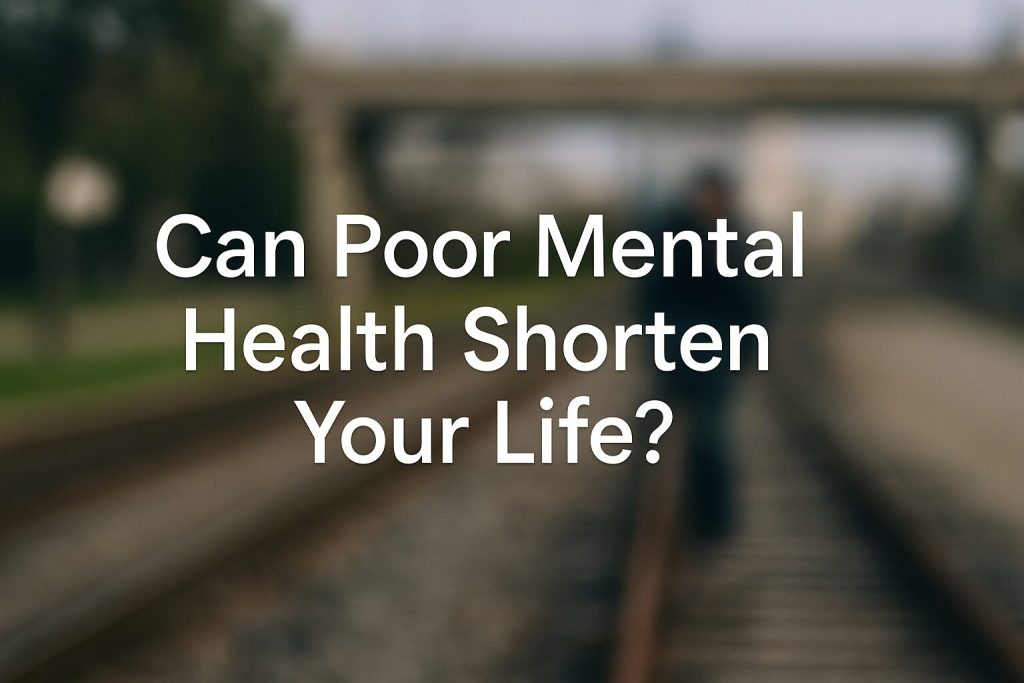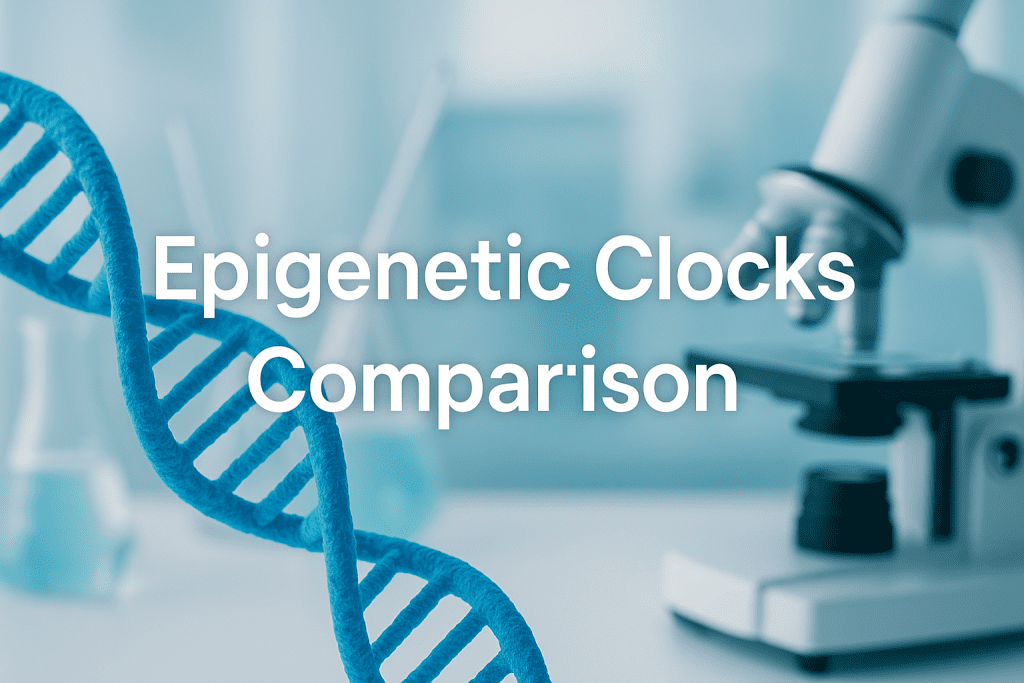
Why Mental Health and Lifespan Are Deeply Connected
Most people think of mental health as something that affects mood or happiness. But research shows the connection goes much deeper. Mental health and lifespan are linked: conditions like depression, anxiety, and schizophrenia are associated with 10–30 years of reduced life expectancy. That’s not only because of suicide, but because poor mental health accelerates biological aging and raises risk of chronic diseases like diabetes, heart disease, and even cancer.
The good news? Lifestyle changes and good care can dramatically shift this risk. In fact, the benefits are often even stronger for people already living with psychiatric conditions .
How Poor Mental Health Speeds Up Aging
Scientists have identified several biological pathways that connect mental health to faster aging:
- Chronic stress chemistry – high cortisol damages organs over time.
- Shorter telomeres – the protective caps on DNA shrink faster under stress and depression.
- Inflammation – constant low-grade inflammation wears down the body and fuels disease.
- Disrupted metabolism – higher blood sugar, higher cholesterol, and hormonal imbalance.
On top of that, unhealthy habits like smoking, alcohol use, inactivity, or poor sleep are more common in psychiatric populations. Together, these act as an accelerator pedal on the aging process.
What the Science Says About Mental Health and Lifespan
Multiple large-scale studies confirm the risks:
- Depression and schizophrenia are linked to significantly shorter life expectancy, mostly from cardiovascular and metabolic diseases.
- Anxiety disorders are tied to higher rates of heart disease and cancer.
- Childhood mental health problems predict premature mortality decades later.
One study found that people with severe mental illness lose on average 10–20 years of life, primarily due to preventable chronic conditions. This highlights why prevention and lifestyle changes matter so much.
Habits That Protect Both Brain and Lifespan
Here’s where it gets encouraging: research also shows that lifestyle changes reduce risk even more strongly in people with psychiatric conditions.
🌿 Move daily
Exercise is one of the most powerful antidepressants we know. It lowers inflammation, improves brain chemistry, and cuts cardiovascular risk.
🥦 Eat nutrient-dense foods
Mediterranean-style diets reduce depressive symptoms and improve metabolic health. Stable blood sugar equals a more stable brain.
😴 Prioritize sleep
Consistently sleeping less than 6 hours is tied to higher mortality. Every extra hour of quality sleep supports brain repair and longevity.
🚭 Quit smoking
Smoking is one of the biggest drivers of early death in psychiatric populations. Quitting can add up to 10 years of life.
🍷 Keep alcohol moderate
Heavy drinking accelerates liver disease, cancer, and injuries. Cutting back lowers risk at any age.
🤝 Build social connection
Strong social ties reduce mortality risk by as much as quitting smoking. Relationships buffer stress and protect health.
🧘 Practice stress regulation
Meditation, breathwork, and structured stress programs reduce relapse in depression and support resilience.
💊 Smart medical care
Medication should be combined with monitoring of heart health, diabetes risk, and weight. Integrating prevention into psychiatric care is essential.
Can Lifestyle Changes Really Matter With Severe Mental Illness?
Yes. Lifestyle changes do not replace therapy or medication, but they make everything else work better.
Research shows the payoff is even bigger in people with psychiatric conditions than in the general population.
Every workout, every healthy meal, every night of sleep is not just self-care, it’s life extension.
🌱 Everyday Actions That Support Mental Health and Lifespan
Science shows small, consistent actions add up. Here are simple habits that reinforce both your mind and your longevity:
✅ Morning sunlight for circadian rhythm and mood
✅ Regular walks to reduce inflammation and improve fitness
✅ Balanced meals with fiber and healthy fats for stable energy
✅ Journaling or gratitude practice to lower stress
✅ Limiting screen time at night for deeper sleep
✅ Volunteering or helping others to strengthen social bonds
Each of these has been studied in both mental health and longevity research: they’re small levers with surprisingly big effects over time.
How Mental Health Affects Disease Risk and Lifespan
A clear way to show the impact is by comparing conditions, disease risk, and average years of life lost:
| Mental Health Condition | Main Increased Risks | Estimated Life Years Lost |
|---|---|---|
| Major Depression | Heart disease, diabetes, inflammation | 7–10 years |
| Schizophrenia | Cardiovascular disease, metabolic syndrome, smoking-related illness | 15–20 years |
| Bipolar Disorder | Stroke, obesity, diabetes, accidents | 10–15 years |
| Severe Anxiety | Hypertension, heart disease, cancer risk | 5–7 years |
| Alcohol Use Disorder | Liver disease, injuries, cancer | 10–20 years |
📊 This table makes clear that mental health challenges aren’t only about mood — they reshape the body’s biology and strongly affect how long people live.
The Key Takeaway
Mental health is not just about how you feel. It is the foundation of your lifespan.
If you want more years, protect your mind. Movement, food, sleep, connection, these are the real levers of longevity. And if you’re curious how your mental health may be influencing your rate of aging, a biological age test can give you an inside look at your body’s clock.
Sources
- Association of History of Psychopathology With Accelerated Aging at Midlife
- A Prospective Study of the Association Between Lifestyle and the Risk of Depressive Symptoms
- Association of Early-Life Mental Health With Biomarkers in Midlife and Premature Mortality
- Major Psychiatric Disorders, Substance Use Behaviors, and Longevity
- Healthy Lifestyle and Risk of Incidence, Mortality and Life Expectancy of Mental Disorders
- Self-Acceptance and Interdependence Promote Longevity
- A Healthy Lifestyle Is Positively Associated With Mental Health and Well-Being
- Mental health can steal decades, but you can take them back – DailyBiohacking.xyz
Created by SimplyAntiAging.com’s Editorial Research Team
Reviewed and updated for accuracy in January 2026.



